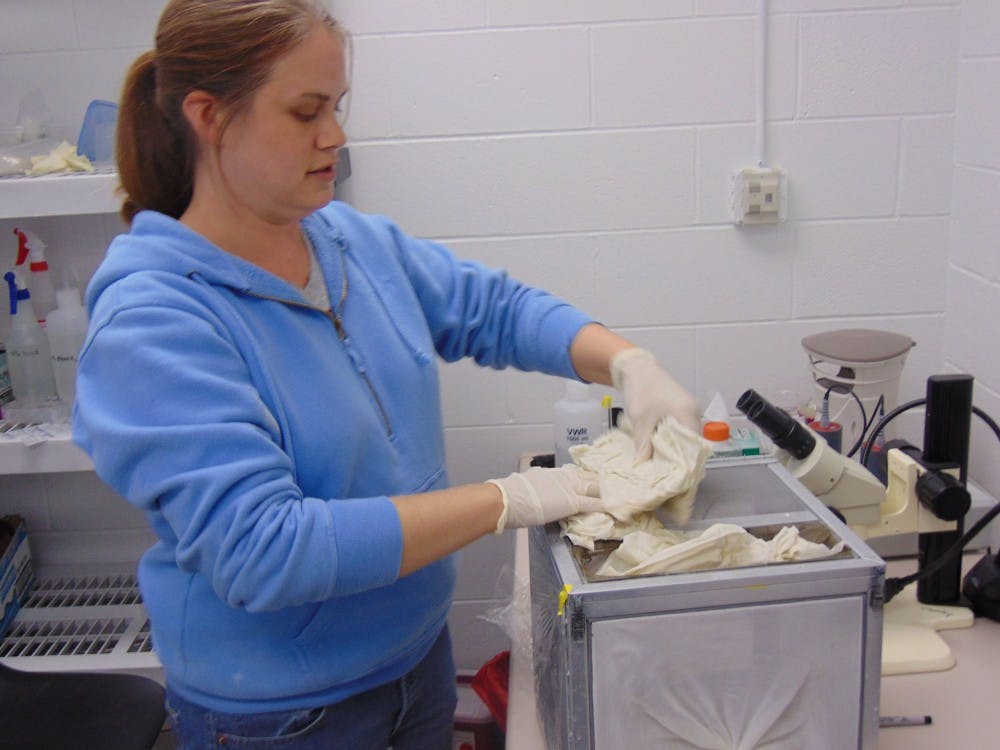Treatment research supported through crowdfunding
Professor developing treatment for deadly Dengue virus

Lab research technician Maya Tree works in a lab Wednesday Nov. 11, 2015. She along with biology professor Michael Conway have been utilizing crowdfunding to finance their work with finding a cure to the dengue virus.
College of Medicine faculty member Michael J. Conway is attempting to fund his research on the Dengue virus using a method that’s gained popularity in recent years: crowdfunding.
Conway said securing funding for research from the federal government can be difficult, so he began looking for other methods. He posted his research project on experiment.com, a website that works similarly to Kickstarter, only with an emphasis on research.
Since posting the proposal, Conway has received $1,000 from 13 donors of his $5,000 goal as of Nov. 11. The page has 11 days left of its 30 period. Conway is hoping the majority of the funding will come in the last few days if his project is featured on the home page of experiment.com
The website uses an all-or-nothing funding model, meaning that if a proposal doesn’t reach its goal, none of the money goes to the project. Conway said he’s planning to rely on federal grants if his project doesn’t meet its goal.
Conway first came to CMU in 2013 and was given funding by the university to begin his research. That original start-up funding is due to end in six months and he began applying for federal grants to continue his research.
Conway’s research focuses on developing a treatment for Dengue fever, a potentially fatal disease that spreads via mosquito bites.
Maya Tree, a lab research technician at CMU and co-sponsor for the experiment.com proposal, began working with Conway on the project a year ago. She does most of the lab work alongside Montague junior Kristopher Kieft.
“(This project) can open up new doors for research,” Kieft said.
Kieft has worked with Conway since his freshmen year, and said he would like to study micro virology as a graduate student.
Conway used to have more students help with research, but reduced the number to save funds. Tree’s job is paid for by start-up funding provided by CMU, and if the project does not receive more money, her job will be terminated.
Tree said that while the $5,000 experiment.com could provide would not allow her to keep her job, it would free up money for other expenses. Tree graduated from CMU in 2010, and said she hopes the project received funds so she could continue working in her hometown on the research.
“That’s why we’re doing crowdfunding,” she said. “We feel this research is really important.”
In 2011, researchers at Massachusetts Institute of Technology created a molecule called the Double-stranded RNA Activated Caspase Oligomerizer, or DRACO for short. The molecule would destroy any cell infected with a virus by inducing apoptosis, causing the cell to kill itself.
The molecule was not medically practical because it could potentially cause cells infected with benign or harmless viruses to perform apoptosis, harming the host organism. Conway’s research focuses on the development of the Antigenic Determinant Activated Caspase Oligomerizer, or ADACO. The molecule only targets cells infected with a specific virus.
ADACO is made by taking the DRACO molecule and adding an antibody domain that targets dengue virus specifically.
So far, all of the tests with ADACO have been performed in a lab, outside of a living host. The tests have also involved inserting ADACO into cells to create a response from the inside. In order to move to testing the ADACO with mice, Conway needs to adjust the molecule to cause apoptosis from outside the cell.
“The exciting thing is you can use this to target any pathogen on the planet,” Conway said.
He used HIV as an example of a major virus that could be treated.



